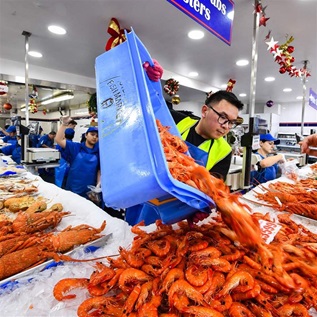Sucessful Spurdog Tagging Programme
Sixteen boats, two kayaks and over 85 anglers in SSACN weekend project.
Over the weekend of 15-16 November, the conservation charity, the Scottish Sea Angling Conservation Network (SSACN), supported by a fleet of angling boats, kayaks and shore anglers, tagged spurdog in Lochs Sunart and Etive.
Spurdog are considered Critically Endangered in the North-east Atlantic by the International Union for Conservation of Nature ( IUCN) and the WWF have placed them on their top ten list as species most likely to face extinction - alongside species like Giant Panda, Siberian tigers etc.
Tagging is the first step in a long process to try and get protection for this species of shark which is in urgent need of strong conservation measures, especially in the case of those believed to be unique resident populations in Loch's Sunart & Etive, the Firth of Lorne and Sound of Mull.
Even though spurdog are almost totally depleted in Scottish waters, this kind of proof is required by the Scottish Government before there is any possibility of the area being designated some form of Marine Protected Area (MPA) which would provide a Spurdog nursery and conservation area and a springboard for the regeneration of the species which would have an additional benefit as it would also help protect the local Common Skate and Thornback Ray populations which are equally threatened.
Ian Burrett, SSACN's Project Director said " Given the time of year and the weather the first SSACN tagathon can only be considered as a resounding success with all boats and many shore anglers catching and releasing spurdog."
"We were absolutely overwhelmed by the level of support and personal commitment shown by anglers, their efforts to try and help preserve one of Scotland's most threatened species puts the government and Marine Directorate to shame."
Denis Kelly, SSACN's Secretary said " If the ongoing catch returns back up the resident population theory, the next step will be a move to indisputable satellite monitoring which will be very expensive and raising the necessary funds will be equally challenging."
The Sea Life aquarium on the shores of Loch Lomond, is supporting the project by highlighting the Spurdog Tagging programme via notice boards in twelve of their UK centres. This will enable the many thousands of people visit every week to understand the issues and support the efforts of SSACN through collection boxes.
Notes to editors
Scottish Sea Angling Conservation Network
The Scottish Sea Angling Conservation Network (SSACN) is a Charity registered in Scotland.
SSACN was established to lead a unified, coordinated and comprehensive approach to international, national and local conservation issues which may affect recreational sea angling in Scotland.
The 2007 Marine Environment Inquiry report by the Environment and Rural Development Committee of the Scottish Government recognised that conservation in the marine environment has historically been very low on the agenda for politicians in Scotland.
SSACN campaigns and works with statutory bodies for the continual improvement of Scottish RSA fisheries and access for all anglers to them so that sea anglers can effectively enjoy their sport within fisheries managed for the benefit of all and not just a select few commercial interests.
Spurdog
In summary spurdog are:
Exceptionally slow-growing and vulnerable to overfishing heavily exploited primarily for European demand for meat considered Critically Endangered in the North-east Atlantic by the IUCN inadequately protected and in danger of collapse from overfishing in Europe in urgent need of stronger conservation measures.
The only way to gather the evidence is by tagging, which will be carried out in two phases:
Our members are already tagging the fish with standard plastic darts with the information collated by the UK shark tagging programme http://www.ukshark.co.uk.
The Scottish Government’s marine scientists at the Fisheries Research Services (FRS) will administer an enhanced programme using satellite tags once we raise the necessary £25,000 to pay for tags and satellite time.
Sea Angling in Scotland
Recreational sea angling is a selective, environmentally friendly and low-impact fishing activity, it is the # 1 coastal recreation activity in Scotland and is of great social and economic importance.
Scotland should be a major sea angling centre based around species that are not readily available elsewhere in the British Isles, but lack of stocks through inefficient and ineffective fisheries management has left many species virtually extinct and many areas barren and fishless.
Sea angling supports many livelihoods and business opportunities and contributes more than £150 million / yr to the Scottish economy; over £20 million a year is being lost to the Scottish economy through the lack of fish stocks and facilities.
Contact:
SSACN - www.ssacn.org
Steve Bastiman, 0044 (0)1561 361 960
Skype: johnshaven [email protected]











